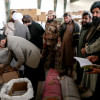Daribha Lyndem's 'Name Place Animal Thing': In Shillong, childhood secrets, adult memories

Shortlisted for the JCB Literature Prize 2021, Name Place Animal Thing (Zubaan Books, 2021) by Daribha Lyndem evokes feelings of nostalgia in a reader merely with its title—it is a popular game among kids. Now, as I hold the novella in my hand, my heart is in a strange turmoil.
The story is based in Shillong and is told through the voice of D, a young Khasi girl. Reading through her experiences, one cannot help but chuckle at how we might live in different parts of the subcontinent, and yet, what binds us together are the childhood experiences we have had while growing up.
My mother grew up in the northeast of India and whenever she was asked about her childhood, she would say, "It was a fairy-tale I spent in a fairyland." The virtual tour of Shillong in Name Place Animal Thing reminded me of her fairy tale, with its cherry blossoms, pine cones, rain-soaked serpentine roads, and lush green hills all around.
D's story is set in the early 2000s and can be easily called a bildungsroman. The character's first-person narrative gives us a close glimpse of her years in Shillong. As a game, Name Place Animal Thing revolves around identities and categorisation. Reading Name Place Animal Thing makes one see themselves lost in the many identities we foster—name, gender, caste, sub-caste, skin colour, sexual orientation, mother tongue, facial features… The list is endless and today, unfortunately, each identity has battles of its own which lead to chaos and confusion.
Picking up this thread, Lyndem weaves an intricate tale that takes us through experiences of bullying, sexual harassment, racism, and xenophobia. Retaining a childlike innocence in D's voice, the novel reads more like confession diaries than a fictitious account of things inspired from real life.
"At ten, I understood mortality. I learnt it that one summer evening when I caught and placed ten milky white butterflies in a large empty Horlicks glass jar…I grew worried when I saw them start to crumple down and, in an attempt to save them, I opened the lid and tipped it over. They all dropped in a white powdery heap on the ground. None of them had survived. In that moment, my inchoate mind understood that life is a thing that can be taken away...", Lyndem's narrator confesses in the novel.
Her debut novel flows freely like a river of emotions. The language, narrative, and descriptions evoke a million feelings ranging from anger, hurt, to anguish and dejection in a reader's mind before dousing the fire with cold water-like reality.
Traversing through the culture, language and settings of Shillong with an unmatched precision, D's story is breezy, ticklish and daunting in its bits and pieces. Be it the cherry blossom trees adorning the roadsides or the simple joy of eating 'aloo-muri chaat' with friends on the way home accompanied by discussions about romance—Lyndem captures the mood of both the protagonist and the settings beautifully.
Half-way through the novel, however, one question that haunts me is—What is new in this story?

There is nothing new in the plot but it is the treatment that is different. The worldview from a child's point of view and how they see things like casteism, politics, sexuality, and social pressures in different ways is uniquely interesting and daunting at the same time.
For D, a 'bandh' (owing to political insurgency) would mean the golden opportunity to miss school and spend more time with her friends. What stands out throughout the novel is the child-like innocence that is depicted through D's naive yet thought-provoking observations, like the way she looks at the class-difference prevalent in the community. "Except for the odd tussle between a non-tribal and the Khasis, in my young mind I felt hardly anything interesting went on in our town", she says.
Lyndem, in her book, crosses the thin line of demarcation between an adult and a child, treading with delicacy and buoyancy. Towards the end of the novel, one feels heavy in the heart—as now you too, the reader, have become a secret bearer. And secrets are always heavy to carry.
Namrata is a writer, a digital marketing professional, and an editor at Kitaab literary magazine.

 For all latest news, follow The Daily Star's Google News channel.
For all latest news, follow The Daily Star's Google News channel. 








Comments